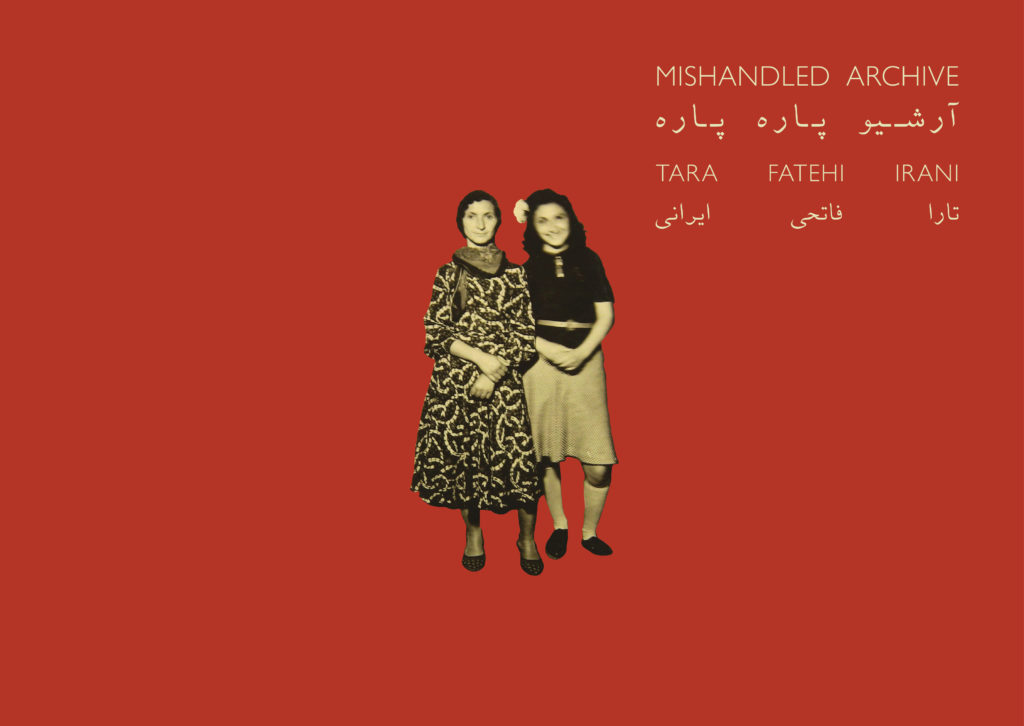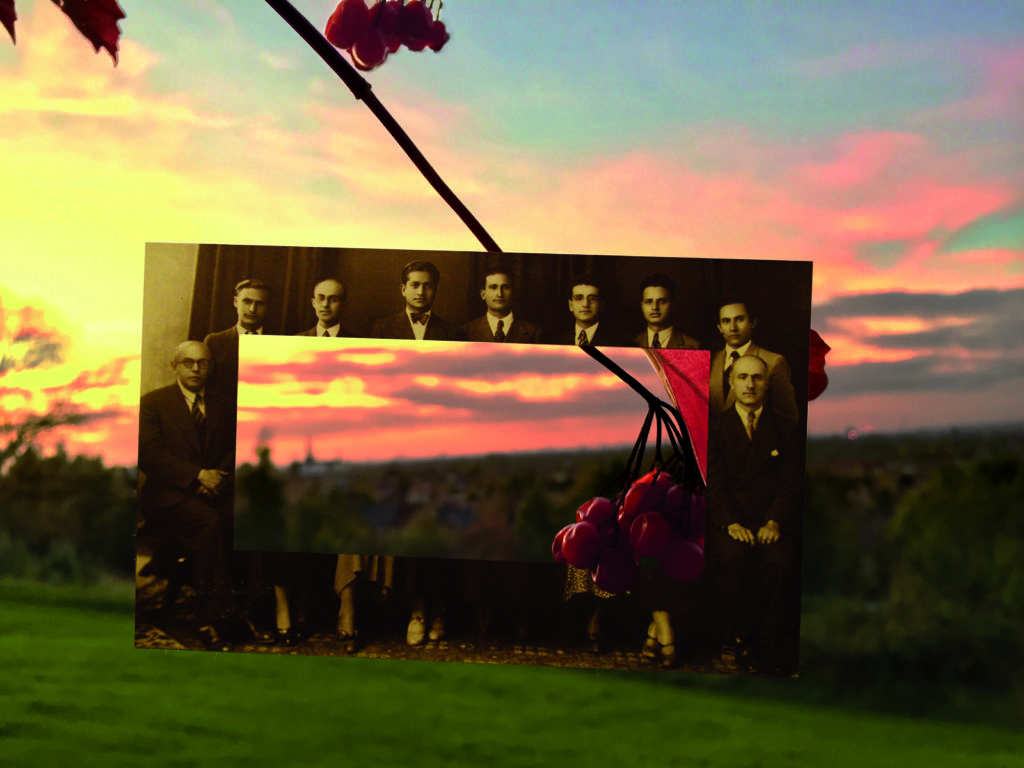Mishandled Archive | Interview with Tara Fatehi Irani
14th December 2020performingborders (Alessandra Cianetti): 2020 has finally brought a piece of good news: your book, Mishandled Archive, has been published by the Live Art Development Agency and launched last month with a warm and joyful online event (LINK). Started in 2017 as multidisciplinary live art, dance, writing, archival project, Mishandled Archive has taken this new visually stunning shape whose images and texts brings us to 2032! Can you tell us a brief story of this journey?
Tara Fatehi Irani: The journey started in 2017, actually late 2016, or I could go further back but let’s say late 2016. I was in the second year of my PhD – that’s often the time when days go by and one constantly wonders ‘what am I doing?’. I needed to make sure my creative practice stays alive and is present in my life and my research every day. Committing to making a little something everyday felt like the way forward. I’d been meaning to start a project with dispersing documents and photographs from a family archive in public places. I had put together an archive myself from a variety of sources – long story, I’ve written and fantasised about it in the book.
I made the ‘rules of my game’: for one year always carry several of photographs or documents copied from my archive, leave one a day at a public place, make a dance on the site, on its back write down a title, the location, the temperature and details of the dance with a message to the finder of the photo. Post one photo with the accompanying text on Instagram. I did this for 365 days. The daily task became a much larger commitment, of time and energy, than I had envisaged but then every day making a new piece and feeling the growing body of these small gestures becoming larger and larger, motivated me more to continue. Halfway through the year, I knew I wanted to turn this into a book.
After the end of the 365 days, I almost immediately made the first version of a performance-installation from the series in Tehran (2018), 365 photographs hanging in the room with a durational performance. I later developed the performance into an hour-long piece which was shown in Toynbee Studios (2019) and further developed with support from Lancaster Arts and performed in Lancaster (2020).
The journey of the book started in 2018 when I started the initial conversations with some of the contributors and with David Caines who designed the book. Right at the beginning of the design process, the UK went into its first lockdown which melted all notions of time and resulted in David and I spending many hours and days working on the layout. It was an incredible experience.
The project also became the core of my practice-as-research doctoral thesis particularly exploring multivocality in history-telling. I was interested in what would remain from this project in the future, so I travelled to the near future in 2032 to see it from the eyes of a mythologist, who I named Anahid Ravanpoor. Anahid became one of the contributors to the book. I also travelled to 2117 and wrote through the eyes of web-archaeologists who discover digital remnants of Mishandled Archive – the latter didn’t make it to the book, perhaps something for the future.

published by Live Art Development Agency, 2020.
performingborders (Alessandra): You have been a long-time contributor of performingborders with your interview (LINK) in 2018 and being one of the two first performance to camera commissions for performingbordersLIVE in 2019 with your mesmerising ‘Borderline Dialogue’ (LINK). Looking back at those two first encounters with our platform, how do you think your performance and research practices have been addressing notions of borders?
Tara: I’m interested in manipulating borders. Resisting and subverting the violence that often comes with them. In Borderline Dialogue I had several conversations with other artists around the world about how we each relate to the notion of borders and I worked with each of them on creating a performance in public space in their own places of residence. That’s where the abstraction of borderlines in urban space met the tension of ongoing border wars. From Hong Kong to Ukraine and Chile, we were eight people separated by geographical distance and political borders and yet we were brought together because of this shared invitation to engage with borders. Just like borders themselves that advocate security while exercising exclusion and violence, there were some contradictions in our distanced interactions.
In Mishandled Archive also, I deal with these contradictions particularly around whose body is allowed to move and where, where is public space, where am I allowed to be and where are the people represented in the photographs in my hand allowed to be. I am aware of my privileges as someone who lives in Europe and particularly in the UK which is amongst the most exclusive countries with its borders closed to many. I’m interested in deterritorialisation of bodies through my art practice, releasing them from the ongoing limitations and the lines drawn by the rulers of particularly colonial borders. And that’s what I’m trying to do through inserting these others, via their photographs, into my surrounding public space which I can tread in thanks to my temporary privilege as a UK resident. I’m interested in how I can subvert notions of belonging and what it means to feel at home or feel without home all of which in one way or another relate to how we treat borders and how we’re treated at borders.
In this book, I had the pleasure and honour of working with the anthropologist and border studies scholar Shahram Khosravi whose writings on borders and nomadism I find highly inspiring particularly for those who are constantly grappling with experiences and emotions of displacement or disbelonging.
performingborders (Alessandra): For the publication you invited a cohort of thinkers, writers, and performers to respond to the 365 entries of your book. Can you tell us more about this constellation and what their contributions have added to your understanding of Mishandled Archive as both a project and a process of shared knowledge?
Tara: I really wanted the book to not be a mere documentation of my artwork. I wanted it to take my work one step further and include new material both from the project and beyond. Going beyond my project happened particularly through inviting other artists and thinkers to contribute to the book. The contributors were all invited to think with Mishandled Archive, so not to write about it but write through it, as a lens through which each writer can muse on topics that are of interest to them. The group of five artists – Mary Paterson, Jemima Yong, Holly Revell, Diana Damian Martin and Maddy Costa – who co-authored a shared piece were specifically invited to create an artwork for the book in response to Mishandled Archive. By embracing the action of passing down images and stories to others, they created their own version of manipulating and redacting stories in repeated cycles of storytelling.
Each of the contributions hold some glimpses from my practice but through being fleshed out in writing and photographs, these glimpses are expanded into realms that go beyond my work. Whether talking about the meticulous lives of an archive, or raising questions around how we can manipulate personal histories or subvert our understandings of ‘family’, and how we can embrace homelessness as a form of belonging, these contributions have taken my practice into new trajectories of thought and new fields.

performingborders (Alessandra): As you mentioned during the book launch, the Mishandled Archive book is another transformation of your long-term project so just the beginning of something new. In what directions are you bringing the project in the future?
Tara: The book is not the end. The object of the book feels quite conclusive, the weight, the ability to hold everything in one place. But of course, performance is a big part of this project. The experience of doing an online performance from the project at the book launch gave me great joy, particularly because it eradicated the borders that would’ve stopped many of the participants from attending a face-to-face book launch in London. So, I’d love to do more of that. Of course, as soon as we are able to be in the same room and move together and breathe the same air as others, the in-person performance-installation will be rescheduled.
In a bit of an odd obsession with keeping this project alive, I’ve been documenting my notes and dedications on each book that I sign before I send it out. Under the circumstances, I’m signing books at home so I spend a lot of time on each book. I sometimes write poetry, sometimes doodle. I write down the room temperature and the location, and then I photograph this. This has become a whole new archive of its own – we’ll see what comes out of it. I’ll also be making a limited edition series of personalised books in which I’m intervening in the book with new photographs, materials, prints and writings. A mishandled mishandled archive perhaps!
To purchase the Mishandled Archive book, please follow: https://www.tarafatehi.com/mishandled-archive-book
Page cover image by Jemima Yong.
Mishandled Archive is published by Live Art Development Agency. The project is supported by Arts Council England and Lancaster Arts.
Tara Fatehi Irani is an artist, performer and writer. She works with performance, text, voice, video, photography, mistranslation, site-specificity and historical inaccuracies. She has performed in houses, basements and streets as well as at the Royal Academy of Arts, SPILL Festival, Nuffield Theatre, Battersea Arts Centre, Toynbee Studios and Molavi Theatre (Tehran) amongst others. Her yearlong daily series of photographs and dances in public space Mishandled Archive is published as a book by Live Art Development Agency (2020). Alongside her solo practice, Tara actively collaborates with other artists currently including Karen Christopher, Pouya Ehsaei and DARC (alongside Ernst Fischer, Holly Revell, Manuel Vason and Jemima Yong). www.tarafatehi.com